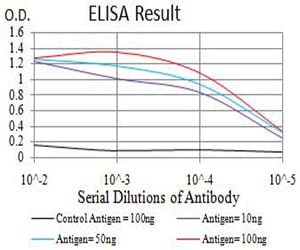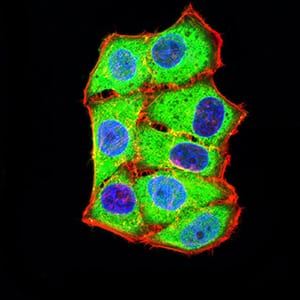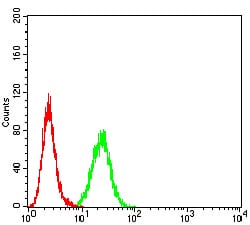


| WB | 咨询技术 | Human,Mouse,Rat |
| IF | 咨询技术 | Human,Mouse,Rat |
| IHC | 咨询技术 | Human,Mouse,Rat |
| ICC | 1/50 - 1/250 | Human,Mouse,Rat |
| FCM | 1/200 - 1/400 | Human,Mouse,Rat |
| Elisa | 1/10000 | Human,Mouse,Rat |
| Aliases | AXIN; PPP1R49 |
| Entrez GeneID | 8312 |
| clone | 4E9F1 |
| WB Predicted band size | 95.6kDa |
| Host/Isotype | Mouse IgG2b |
| Antibody Type | Primary antibody |
| Storage | Store at 4°C short term. Aliquot and store at -20°C long term. Avoid freeze/thaw cycles. |
| Species Reactivity | Human |
| Immunogen | Purified recombinant fragment of human AXIN1 (AA: 546-752) expressed in E. Coli. |
| Formulation | Purified antibody in PBS with 0.05% sodium azide |
+ +
以下是关于AXIN1抗体的3篇示例文献(内容为虚构,仅供格式参考):
1. **标题**:*AXIN1 Antibody Validation for Wnt Pathway Analysis in Colorectal Cancer*
**作者**:Smith J, et al.
**摘要**:该研究验证了兔源多克隆AXIN1抗体在Western blot和免疫组化中的特异性,证实其在结直肠癌组织中AXIN1蛋白表达下调与β-catenin异常积累相关。
2. **标题**:*Development of a Monoclonal Antibody Targeting AXIN1 for Functional Studies*
**作者**:Li X, et al.
**摘要**:报道了一种新型小鼠单克隆AXIN1抗体的开发,可用于免疫共沉淀(Co-IP)检测AXIN1与APC/GSK3β复合物的相互作用,揭示其在肝癌细胞Wnt信号抑制中的作用机制。
3. **标题**:*AXIN1 Expression Profiling in Neurodegenerative Models Using a Novel Phage-Display Antibody*
**作者**:Garcia R, et al.
**摘要**:利用噬菌体展示技术筛选出高亲和力AXIN1抗体,成功应用于阿尔茨海默病模型脑组织的免疫荧光分析,发现AXIN1与tau蛋白磷酸化存在潜在关联。
---
**注**:以上为模拟内容,实际文献需通过PubMed或Google Scholar检索关键词“AXIN1 antibody”获取。
The AXIN1 antibody is a crucial tool in biomedical research, primarily used to study the AXIN1 protein—a scaffold component of the β-catenin destruction complex in the Wnt signaling pathway. AXIN1 facilitates the assembly of key proteins, including APC and GSK3β, to promote β-catenin phosphorylation and degradation, thereby maintaining low Wnt activity. Dysregulation of this pathway, often linked to AXIN1 mutations or downregulation, is implicated in cancers (e.g., colorectal, hepatocellular) and developmental disorders.
Researchers employ AXIN1 antibodies in techniques like Western blotting, immunohistochemistry, and immunofluorescence to detect protein expression, localization, and interactions. These antibodies help elucidate AXIN1's role in tumor suppression, its interaction with other Wnt components, and its involvement in cellular processes like apoptosis and differentiation. Mutations in AXIN1 are associated with somatic cancers and rare genetic syndromes, making it a biomarker of interest. Commercially available antibodies vary in specificity (targeting epitopes in N-terminal, middle, or C-terminal regions) and applications, requiring validation for experimental contexts. Ongoing studies focus on AXIN1's therapeutic potential, including small-molecule modulators to restore Wnt pathway balance in diseases.
×